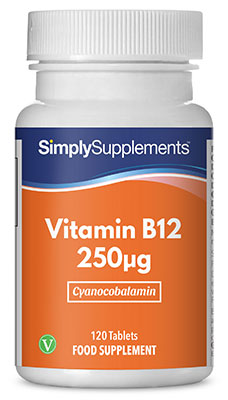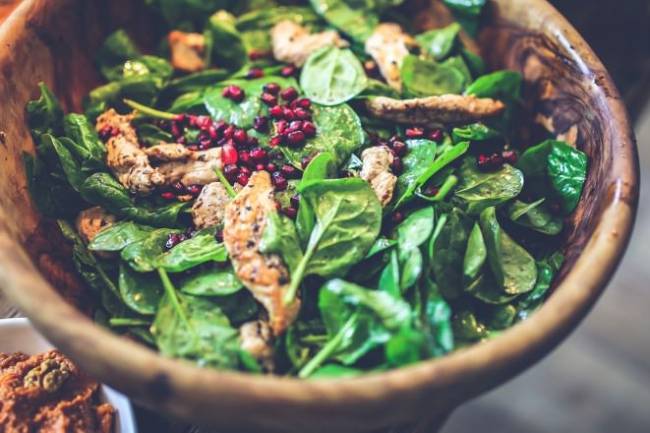Health Benefits of Vitamin B12

If you are often tired and lacking in energy, it may be that you need to boost your vitamin B12 levels. This essential B vitamin helps to maintain a healthy nervous system and reduces feelings of tiredness and fatigue.
What is Vitamin B12?
Vitamin B12, also called cobalamin, is part of the vitamin B family and so plays an important role in the body’s production of energy and the maintenance of the nervous system. B12 is also essential for the proper development and function of red blood cells, nerve cells, and DNA and RNA neurotransmitters. There is promising evidence that B12 may help to reduce the risk of heart disease and dementia, especially when taken in combination with vitamin B6 and folic acid.
Vitamin B12 Benefits
Vitamin B12 has an extensive list of potential health benefits, including:
- Energy: B12 plays an important role in the conversion of carbohydrates into glucose, which is the body’s main source of fuel. It is thought that B12, along with the other B vitamins, helps to maintain sustained energy levels and may even boost athletic performance and endurance.
- Healthy red blood cells: Low levels of B12 affect the normal division of red blood cells and the replication of DNA which can result in the production of abnormally large cells (macrocytosis).
- Nervous system: B12 promotes normal neurological activity, mental clarity and emotional stability. There is a growing body of evidence which supports the use of B12 in the reduction of age-related brain shrinkage.
- Homocysteine levels and heart health: A long list of heart-related conditions is linked to excessive homocysteine levels, including high blood pressure, heart attacks and strokes. It is thought that vitamin B12 helps to normalise homocysteine levels to reduce the risk of these conditions.
- Memory: High homocysteine levels are also closely linked to the progression of dementia and Alzheimer’s disease. Studies show that a combination of B12, B6 and folic acid can help to reduce homocysteine levels, and potentially reduce the risk of such brain disorders.
- Hair skin and nails: B12 is essential for healthy cell reproduction and so supports the renewal and repair of cells in the hair, skin and nails.
- Tinnitus: Studies have found that people suffering from tinnitus are often vitamin B12 deficient. However, the evidence is inconclusive and more studies are required.
Vitamin B12 Deficiency
For most adults the risk of vitamin B12 deficiency is low. However, if you are over the age of 50, eat a strict vegetarian diet or suffer from digestive conditions such as Crohn's or coeliac disease you will struggle to absorb sufficient levels of B12 from the diet alone.
When the body’s B12 levels are too low several functions become disrupted. It reduces the production of healthy new blood cells, which can cause significant damage over time and can lead to pernicious anaemia which causes memory loss, confusion and even dementia.
You are more at risk of a vitamin B12 deficiency if you fall into one of the following groups:
- Eat a strict vegetarian diet
- Consume excessive amounts of alcohol
- Are pregnant
- Suffer from digestive problems such as coeliac disease or Crohn’s
- Are over the age of 50.
Adults over the age of 50 are more likely to have low levels of B12 because the ageing digestive system loses the ability to absorb B12 due to a lack of hydrochloric acid in the stomach. This stomach acid is needed to free vitamin B12 from the proteins it is bound to in foods and allow the body to absorb it.
Vegetarians are unable to get B12 from the natural diet because plants contain no B12, and so they need to consume fortified foods or supplements alongside their normal diet.
The most common signs of vitamin b12 deficiency include:
- Fatigue
- Muscle weakness
- Unexplained weight loss
- Shortness of breath
- Vision problems
- Poor memory
- Constipation
- Bleeding gums and mouth sores
- In children, deficiency can cause problems with movement and delays reaching typical developmental milestones.
Sources of Vitamin B12
The best food sources of vitamin B12 are red meat, liver, eggs, milk and cheese. Some people may struggle to absorb B12, even from natural sources, so it is often administered in high doses to ensure that at a minimum amount gets absorbed.
Vitamin B12 is available in several other sources. Adults with digestive disorders or pernicious anaemia are often given high dose vitamin B12 injections around 50 to 100mcg three times a week. It can also be prescribed as a nasal gel. Vitamin B12 supplements are popular with adults in the ‘at risk’ groups. These are available as both traditional tablets and sublingual tablets (which are placed under the tongue to dissolve), and both appear to be as effective as each other.
How Much Should I Take?
Adults need 2.6mcg a day and if you regularly eat meat and dairy foods you should be able to get this from your diet. However, if you are a strict vegetarian or over the age of 50, you may need to consider adding fortified foods or supplements to your diet.
Vitamin B12 is safe to consume during pregnancy at 2.6mcg per day. However, when breastfeeding this increases slightly to 2.8mcg per day.
People being treated for pernicious anaemia should follow dosage instructions from their doctor. Very high doses are required and so will need to be closely monitored.
Side Effects and Interactions
There are no reports of vitamin B12 toxicity or adverse effects, even when administered in high doses above 2mg per day. This is primarily because vitamin B12 is water-soluble, which means that any excess is excreted through the urine.
B12 is known to interact with the antibiotic chloramphenicol, which is used to treat certain bacterial infections. Taking chloramphenicol for sustained periods of time can reduce the production of new blood cells and reverse the beneficial effects of vitamin B12.

 Nicole
Nicole 

























